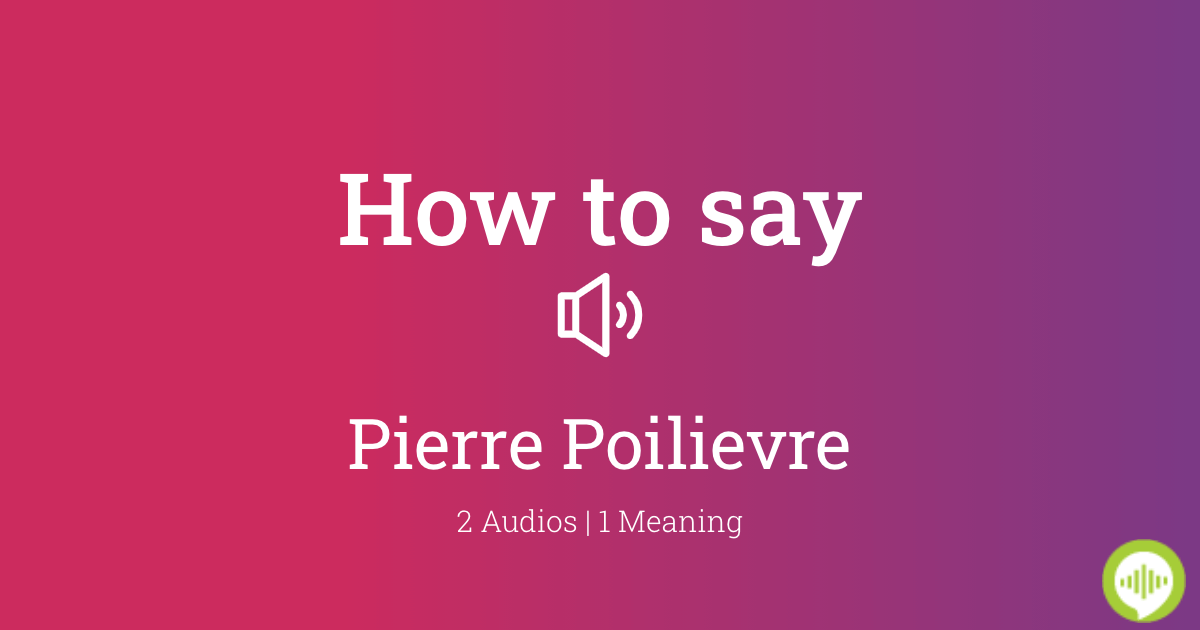Have you ever wondered if Poilievre is French? Well, buckle up, because we're diving deep into this linguistic mystery that’s got tongues wagging—and not just in France! This question isn’t just about some random word or name; it’s a fascinating journey through language, culture, and history. So, grab your beret and let’s get started!
Now, if you're scratching your head wondering who or what Poilievre is, don’t worry. We’ll break it down for you in a sec. But first, let’s address the elephant in the room: Is Poilievre French? The short answer is yes, but the long answer is where the real fun begins. It’s like opening a treasure chest filled with linguistic gold.
For those of you who are language enthusiasts, history buffs, or just plain curious, this article is your ticket to understanding the connection between Poilievre and the French language. So, whether you're brushing up on your French vocab or just looking for a good story, you're in the right place.
Read also:Jennifer Garners Heartwarming Throwback To Donny Osmond
Who is Poilievre Anyway?
Let’s start with the basics. Poilievre, pronounced "pwah-lee-vruh," is a surname of French origin. If you’ve ever stumbled upon this name, you might have noticed its unmistakable Gallic flair. But what makes it so French? Well, buckle up, because we’re about to dive into the world of etymology and uncover the roots of this intriguing surname.
A Brief History of the Name Poilievre
The name Poilievre has a rich history that dates back to medieval France. Back in the day, surnames were often derived from occupations, locations, or even physical characteristics. Poilievre, it turns out, is believed to have originated from the French word "poil," meaning "hair," and "lievre," meaning "hare." So, if you translate it literally, it roughly means "hairy hare." Quite the image, right?
But don’t let the literal translation fool you. Names often carry deeper meanings and stories. In this case, Poilievre might have been given to someone who had a striking resemblance to a hare, perhaps due to their speed or agility. Or, it could have been a playful nickname that stuck through the generations. Either way, it’s a name with character.
Is Poilievre French? The Language Connection
Now that we’ve got the basics down, let’s tackle the big question: Is Poilievre French? The answer lies in the language itself. French, as you might know, is a Romance language with roots in Latin. Over the centuries, it has evolved into the beautiful, melodic language we know today. And Poilievre, with its distinct pronunciation and spelling, is a testament to that evolution.
French Language: A Quick Overview
French is spoken by over 300 million people worldwide, making it one of the most widely spoken languages on the planet. It’s the official language of 29 countries and plays a significant role in international diplomacy, culture, and cuisine. But what makes it so special? For starters, it’s got that je ne sais quoi—a certain something that makes it stand out.
French is known for its complex grammar rules, rich vocabulary, and, of course, its accent. And when it comes to names like Poilievre, the language adds an extra layer of intrigue. The way it rolls off the tongue, the subtle nuances in pronunciation—all of it contributes to the name’s French identity.
Read also:Prince Charles Visits Scotland A Day Full Of Fun And Crafts
Etymology: Tracing the Roots of Poilievre
Etymology is the study of the origin of words, and when it comes to Poilievre, there’s a lot to uncover. As we mentioned earlier, the name is derived from two French words: "poil" and "lievre." But what does that mean in the grand scheme of things?
Breaking Down the Name
Let’s break it down further. "Poil" refers to hair, and "lievre" refers to a hare. So, when you put them together, you get "hairy hare." But why would someone be called that? Well, back in the day, people were often given nicknames based on their physical characteristics or personality traits. Maybe the first Poilievre was a fast runner, or maybe they had a lot of hair. Either way, the name stuck.
Etymology is like a puzzle, and each piece tells a story. In the case of Poilievre, the story is one of language, culture, and identity. It’s a reminder of how names can carry meaning and history, connecting us to the past in unexpected ways.
French Influence Around the World
While Poilievre might be a French name, its influence extends far beyond the borders of France. French culture, language, and cuisine have made their mark on the world, and names like Poilievre are a testament to that influence.
French Names in Other Countries
French names can be found all over the world, from Canada to Louisiana, and even in parts of Africa and Asia. In Canada, for example, French is one of the official languages, and many people have French surnames. In Louisiana, the French influence is evident in the cuisine, music, and even the language itself. And in parts of Africa, French is still spoken as a result of colonial history.
So, while Poilievre might be French in origin, it’s part of a much larger story—a story of migration, adaptation, and cultural exchange. It’s a reminder that language and identity are fluid, and that we’re all connected in ways we might not even realize.
Modern-Day Poilievres
Fast forward to the present day, and you’ll find Poilievres all over the world. Whether they’re in France, Canada, or beyond, they carry with them the legacy of their name. But what does it mean to be a Poilievre in the 21st century?
Embracing Identity
For many people with French surnames, embracing their identity is an important part of their lives. It’s about connecting with their roots, understanding their history, and celebrating their heritage. For Poilievres, that means embracing the French language, culture, and traditions that come with the name.
But it’s not just about the past. It’s also about the future. In a world that’s becoming increasingly globalized, names like Poilievre serve as a reminder of our shared humanity. They’re a bridge between cultures, a link to the past, and a promise for the future.
Language and Identity
Language is more than just a means of communication. It’s a reflection of who we are, where we come from, and where we’re going. For Poilievres, the French language is an integral part of their identity. But what does that mean in today’s world?
The Importance of Language
In a world where English dominates, preserving languages like French is more important than ever. Language is a tool for communication, but it’s also a repository of knowledge, culture, and tradition. For Poilievres, speaking French is a way of honoring their heritage and keeping their identity alive.
But it’s not just about speaking the language. It’s about understanding the culture, the history, and the values that come with it. It’s about embracing diversity and celebrating the differences that make us unique.
Is Poilievre French? The Final Verdict
So, is Poilievre French? The answer, as we’ve seen, is a resounding yes. From its etymology to its cultural significance, Poilievre is undeniably French. But it’s also so much more than that. It’s a name with history, meaning, and identity—a name that connects us to the past while pointing us toward the future.
Why It Matters
In a world that’s becoming increasingly homogenized, names like Poilievre remind us of the importance of diversity. They’re a celebration of our differences, a reminder of our shared humanity, and a promise to future generations. So, whether you’re a Poilievre or just someone who appreciates the beauty of language and culture, this name has something to offer.
Conclusion
In conclusion, Poilievre is indeed French, and that’s something to celebrate. From its etymology to its cultural significance, this name is a testament to the power of language and identity. It’s a reminder that names carry meaning, history, and stories—and that those stories are worth telling.
So, the next time you meet someone with the name Poilievre, take a moment to appreciate the richness of their heritage. And if you’re a Poilievre yourself, wear that name with pride. After all, it’s more than just a name—it’s a piece of history, a connection to the past, and a promise for the future.
And don’t forget to share this article with your friends! Who knows, you might just inspire someone to learn more about their own name and heritage. Because at the end of the day, we’re all connected by the stories we tell—and the names we carry.
Table of Contents
- Is Poilievre French? Unveiling the Truth Behind the Language Connection
- Who is Poilievre Anyway?
- A Brief History of the Name Poilievre
- Is Poilievre French? The Language Connection
- French Language: A Quick Overview
- Etymology: Tracing the Roots of Poilievre
- Breaking Down the Name
- French Influence Around the World
- French Names in Other Countries
- Modern-Day Poilievres
- Embracing Identity
- Language and Identity
- The Importance of Language
- Is Poilievre French? The Final Verdict
- Why It Matters
- Conclusion


